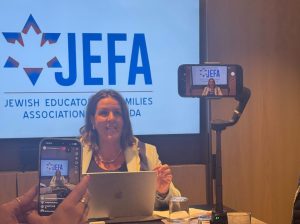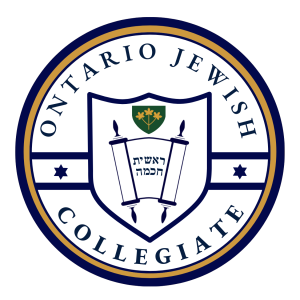TORONTO — Alex Pomson and Randal Schnoor originally set out to write a book about teachers in Jewish day schools, but as their research progressed they shifted their focus to parents.
Their new book, Jewish Day School in the Lives of Adult Jews (Wayne State University Press, $26.95), focuses on Toronto’s Paul Penna Downtown Jewish Day School.
The Penna school is unique, among other reasons, for its non-traditional location away from the suburbs where most of the Jewish community lives, and for its student population, which has an uncommonly high proportion of children of intermarried or same-sex couples.
But Schnoor, a sociologist who teaches at York University’s Centre for Jewish Studies, and Pomson, a senior lecturer at the Melton Centre for Jewish Education at the Hebrew University of Jerusalem, maintain that lessons can be drawn from their research that are broadly applicable.
“It’s not that the phenomena we saw there don’t occur anywhere else,” said Pomson. “What was unusual was the intensity of the phenomena because of the intensity of the proportion of families that don’t have deep Jewish backgrounds or large Jewish networks.
“Our argument is that it’s possible that more such families could be attracted to Jewish day schools if the schools knew better how to talk their language.”
The book began as a sabbatical project for Pomson when he served as co-coordinator of the Jewish Teacher Education Program at York University.
Early in the project, his focus was on how teachers translate ideas for use in the classroom. But the more time he spent at the school, the more he became aware of “the frequent and often intense presence of parents,” he said in a phone interview from Chicago on a recent visit to North America.
Schnoor and research assistant Dafna Ross came on board following the receipt of a research grant five months into the project.
As research progressed, Pomson said, “we were frequently deeply surprised by how meaningful and deeply important what parents were doing, was to them as adult Jews.”
The widespread nature of that discovery, which was observed in the two other Toronto day schools and three American ones that were studied, came as a surprise to Pomson, a father of four whose children attended an Orthodox day school in Toronto before the family moved to Israel in 2004.
Another surprise for Pomson was the role of non-Jewish parents in the school community. “I came to the project deeply skeptical about the possibility of raising Jewishly literate and committed kids in intermarried families, and I saw plenty of examples of families who were intermarried and who were deeply invested in their children’s education.
“Whether you can generalize from that, I don’t think I’m prepared to say, because this is a really small sample, but I was surprised by how seriously interested many non-Jewish parents were in their child’s schooling.”
Another phenomenon noted in the book was the role the school played in some cases by acting as a synagogue substitute, in part by providing a Jewish community and also by serving as a resource for information on Judaism.
Pomson said that “very little” has been published on the subject of day schools, and even less on the subject of day school parents.
He expects the new book will be used in academic settings, both graduate and undergraduate, in courses on contemporary Jewry and Jewish education. As well, he said, professional and lay leaders of Jewish day schools may discover new ideas about the relationship between parents and their children’s schools.
Schools may not realize that parents look for schools to help them connect to their peers, to a Jewish community and to Jewish learning, said Schnoor. “They might want to pay more attention to that in the marketing of their schools.”
The father of a 3-year-old daughter and 2-year-old son, Schnoor – who graduated from United Synagogue Day School and the Community Hebrew Academy of Toronto – found the project had personal relevance for him and his wife as they investigated Jewish schools for their children.
As a parent, said Schnoor, “I’m looking for, among other things, a parent body that I’m going to feel comfortable with over the next few years.”
Although he noted that there is more to a school than its parent body, “the research reinforced for me the importance of the way a school can provide a comfortable fit for a Jewish parent.”






